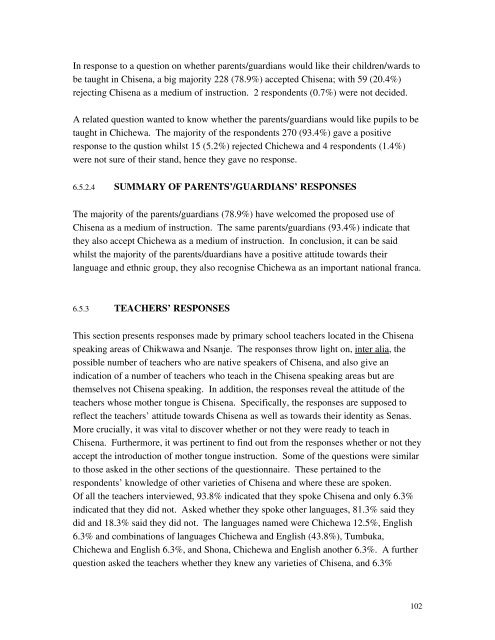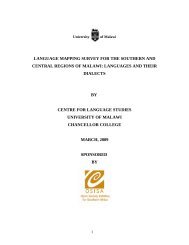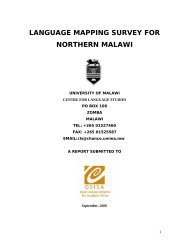SOCIOLOLINGUISTIC SURVEYS - Centre for Language Studies
SOCIOLOLINGUISTIC SURVEYS - Centre for Language Studies
SOCIOLOLINGUISTIC SURVEYS - Centre for Language Studies
You also want an ePaper? Increase the reach of your titles
YUMPU automatically turns print PDFs into web optimized ePapers that Google loves.
In response to a question on whether parents/guardians would like their children/wards to<br />
be taught in Chisena, a big majority 228 (78.9%) accepted Chisena; with 59 (20.4%)<br />
rejecting Chisena as a medium of instruction. 2 respondents (0.7%) were not decided.<br />
A related question wanted to know whether the parents/guardians would like pupils to be<br />
taught in Chichewa. The majority of the respondents 270 (93.4%) gave a positive<br />
response to the qustion whilst 15 (5.2%) rejected Chichewa and 4 respondents (1.4%)<br />
were not sure of their stand, hence they gave no response.<br />
6.5.2.4 SUMMARY OF PARENTS’/GUARDIANS’ RESPONSES<br />
The majority of the parents/guardians (78.9%) have welcomed the proposed use of<br />
Chisena as a medium of instruction. The same parents/guardians (93.4%) indicate that<br />
they also accept Chichewa as a medium of instruction. In conclusion, it can be said<br />
whilst the majority of the parents/duardians have a positive attitude towards their<br />
language and ethnic group, they also recognise Chichewa as an important national franca.<br />
6.5.3 TEACHERS’ RESPONSES<br />
This section presents responses made by primary school teachers located in the Chisena<br />
speaking areas of Chikwawa and Nsanje. The responses throw light on, inter alia, the<br />
possible number of teachers who are native speakers of Chisena, and also give an<br />
indication of a number of teachers who teach in the Chisena speaking areas but are<br />
themselves not Chisena speaking. In addition, the responses reveal the attitude of the<br />
teachers whose mother tongue is Chisena. Specifically, the responses are supposed to<br />
reflect the teachers’ attitude towards Chisena as well as towards their identity as Senas.<br />
More crucially, it was vital to discover whether or not they were ready to teach in<br />
Chisena. Furthermore, it was pertinent to find out from the responses whether or not they<br />
accept the introduction of mother tongue instruction. Some of the questions were similar<br />
to those asked in the other sections of the questionnaire. These pertained to the<br />
respondents’ knowledge of other varieties of Chisena and where these are spoken.<br />
Of all the teachers interviewed, 93.8% indicated that they spoke Chisena and only 6.3%<br />
indicated that they did not. Asked whether they spoke other languages, 81.3% said they<br />
did and 18.3% said they did not. The languages named were Chichewa 12.5%, English<br />
6.3% and combinations of languages Chichewa and English (43.8%), Tumbuka,<br />
Chichewa and English 6.3%, and Shona, Chichewa and English another 6.3%. A further<br />
question asked the teachers whether they knew any varieties of Chisena, and 6.3%<br />
102





